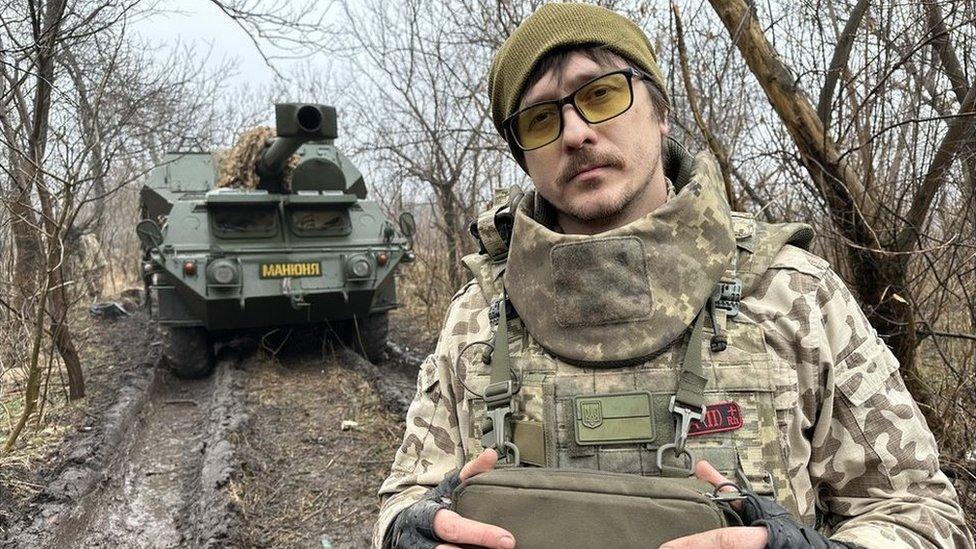Ukraine war: A front-line town torn between determination and despair
- Published
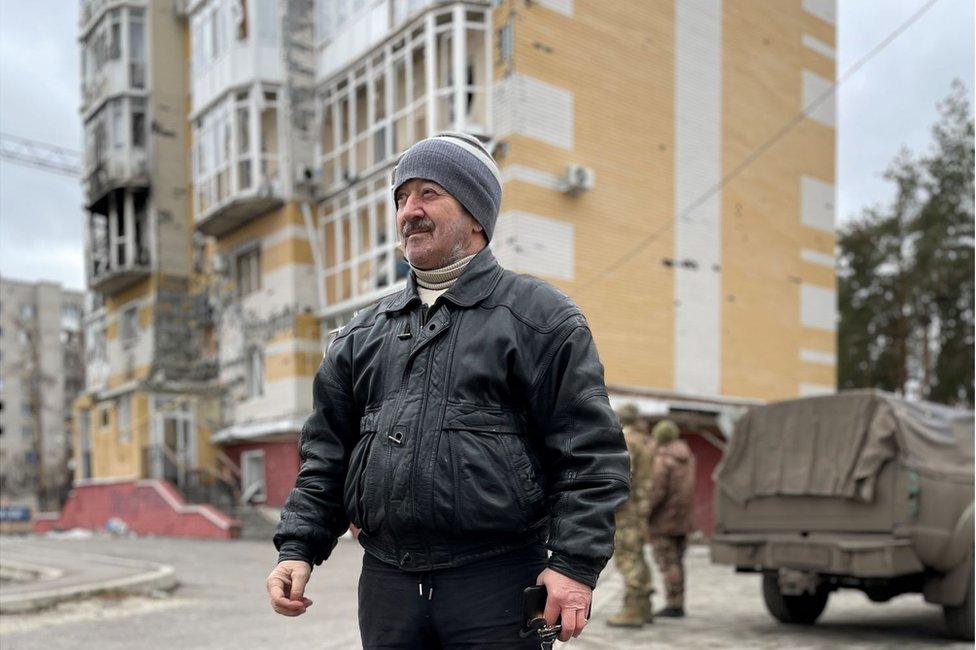
Oleskandr Rogovitz now doubts that Ukraine can win the war
No one town can capture the mood of this huge, struggling nation, after almost two years of war.
But perhaps Lyman comes close.
This is a small, half-ruined railway town, first seized by Russia, then liberated, and now trapped, precariously, near the frontlines of the Donbas. Its civilian inhabitants seem torn between determination and despair.
"Only peace matters now. I want peace. Only peace. On any terms," said Oleksandr Rogovitz, a 74-year-old retired businessman, living alone in the icy ruins of a nine-storey apartment block on the edge of Lyman.
When we first met Oleksandr and his eight cats exactly one year ago, hours after a powerful Russian missile had torn apart one side of his building, he shared the widespread belief that Ukraine could still win this war.
"Now I've had time to think, and I have changed my mind. Too many people are dying," he said last week, suggesting the time had come to trade land for peace with Russia.
It's not an opinion you hear too often in Ukraine, and may, perhaps, be rarely felt. But it does illustrate the impact that unending months of conflict appear to be having on a weary population.
A few explosions, muffled by the forest and a fresh layer of snow, boomed across town from the direction of the front lines, still some 15km (nine miles) to the east, as Oleksandr, looking drawn and unwashed, shuffled away towards a dark stairwell.
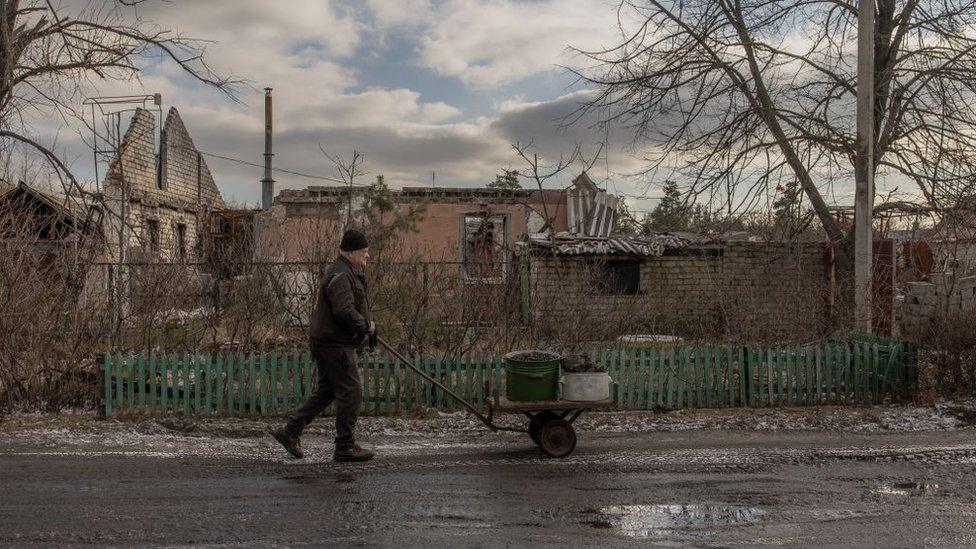
Some Lyman residents still need to search for coal or wood to heat their damaged homes
The failure of Ukraine's counter-offensive last year is clearly weighing heavily on many in Lyman. Too close to the front to qualify for major reconstruction funds from the central government, the town's council is limited to paying pensions, trying to restore electricity, and sending work parties out to trim trees. The main bridge into town remains a bombed ruin.
"Our youth are being exterminated. If this continues there will be no Ukraine left," said Nadezhda Anatolievna, 80, as the sound of another distant explosion echoed, almost unnoticed, around the yard where she and other pensioners were queuing for food donations.
"It seems to me this war will go on for a long time," said Natalia Martynenko, 63, stamping her feet in the freezing cold.
But the gloom is not shared by everyone here.
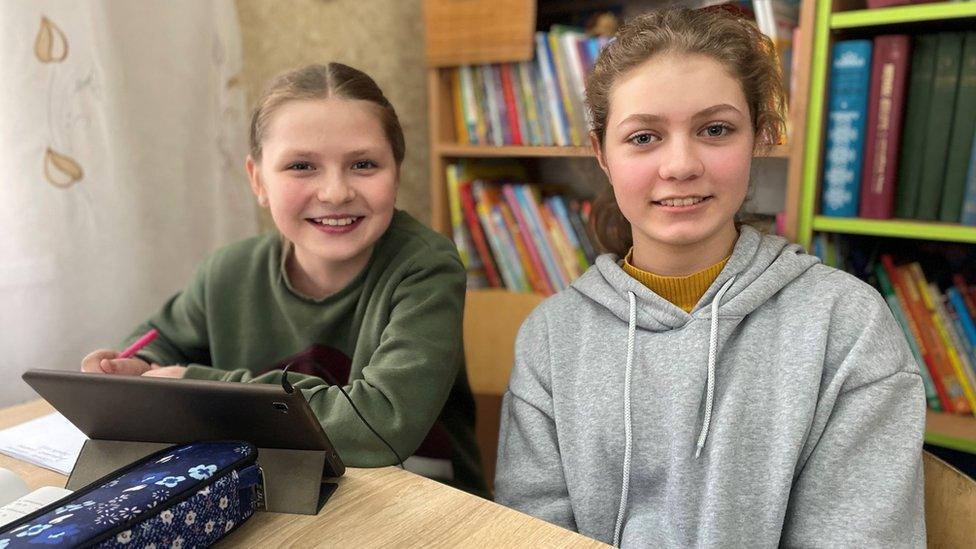
Anya (left) says she wants peace and calm, but is already accustomed to living in wartime
The town, built in a forest clearing around a once important railway junction, which is now a scrawl of broken rails and cables, is still home to several hundred children, who now study online but often gather at a dozen small meeting points to get help with their homework and to visit friends.
"I have everything I need. I don't want anything else, except peace and calm," said 14-year-old Anya, giggling with three friends at the back of a warm classroom. They all agreed they'd got used to this new way of life, which was now "normal".
When we visited a year ago, many people in Lyman were living in their cellars, having endured the Russian bombardment and occupation of Lyman, and its subsequent liberation by Ukrainian troops. Last week, on Railway Street, several members of the Dmytrenko family were still sleeping underground.
We're all tired, physically and mentally. But we're waiting for victory... How can you negotiate with murderers?
"Our flat was destroyed. Where else can we go?" asked Mariia Dmytrenko, glancing away from a television attached to the cellar wall. But she welcomed the fact that more shops were open, electricity was now uninterrupted, and her daughter Irina, a railway accountant, had found a new job working for the council.
"It's slightly better than it was a year ago. Thank God there is public transport and other services. We're all tired, physically and mentally. But we're waiting for victory. I don't think [negotiations] are possible after so many people have been killed. How can you negotiate with murderers?" said 42-year-old Irina, adding that she felt that any Russian sympathisers in Lyman had long since left town.
The mayor of Lyman, Oleksandr Zhuravlov, recently moved his office to a new building, hoping to avoid being targeted by Russian missiles. He said he had no right to admit to being tired, or pessimistic, but did admit to being worried about news reports suggesting the US might stop sending arms to Ukraine.
"We need to agree on an extension of military assistance, because, as you know, we are fighting a monster. A monster with plenty of oil and gas resources with which to buy weapons. For now, our military is holding on as best they can… but they lack weapons and ammunition and this is a big concern."
The town has plans in case another evacuation is required.
But there are other pressing concerns, including the fact that not a single piece of farmland in the area has been cleared of mines.
As we prepared to drive out of Lyman, a cluster of distant explosions rattled the few windows still in place on Railway Street.
Just beyond the edge of town, trucks had pulled over in the snow to collect hundreds of pine logs, cut and trimmed by a team of workmen.
We were told the logs would probably be used to help reinforce the defensive trenches that Ukraine is now building, as fast as it can, as it prepares to counter another Russian offensive that could well threaten Lyman and its remaining inhabitants once again.
Related topics
- Published14 February 2024
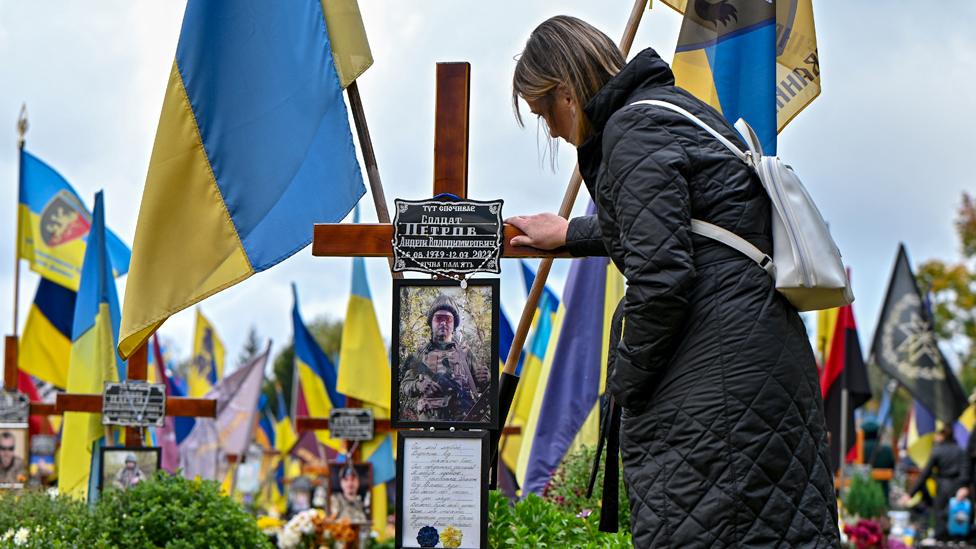
- Published15 February 2024
